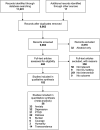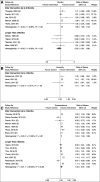Mental Health Interventions to Improve Psychological Outcomes in Informal Caregivers of Critically Ill Patients: A Systematic Review and Meta-Analysis
- PMID: 33826586
- PMCID: PMC8373445
- DOI: 10.1097/CCM.0000000000005011
Mental Health Interventions to Improve Psychological Outcomes in Informal Caregivers of Critically Ill Patients: A Systematic Review and Meta-Analysis
Abstract
Objectives: Determine effect of mental health interventions on psychologic outcomes in informal caregivers of critically ill patients.
Data sources: Searches conducted in MEDLINE, Embase, and other databases from inception to October 31, 2019.
Study selection: Interventions for informal caregivers of critically ill patients in adult ICU, PICU, or neonatal ICU.
Data extraction: Two independent, blinded reviewers screened citations and extracted data. Random-effects models with inverse variance weighting pooled outcome data when suitable. Psychologic outcomes categorized: 1) negative (anxiety, depression, post-traumatic stress disorder, distress, and burden) or 2) positive (courage, humanity, justice, transcendence, temperance, and wisdom and knowledge). Stratification according to intervention type and patient population was performed.
Data synthesis: Of 11,201 studies, 102 interventional trials were included (n = 12,676 informal caregivers). Interventions targeted caregiver experience (n = 58), role (n = 6), or support (n = 38). Meta-analysis (56 randomized controlled trials; n = 22 [39%] in adult ICUs; n = 34 [61%] in neonatal ICU or PICU) demonstrated reduced anxiety (ratio of means = 0.92; 95% CI, 0.87-0.97) and depression (ratio of means = 0.83; 95% CI, 0.69-0.99), but not post-traumatic stress disorder (ratio of means = 0.91; 95% CI, 0.80-1.04) or distress (ratio of means = 1.01; 95% CI, 0.95-1.07) among informal caregivers randomized to mental health interventions compared with controls within 3 months post-ICU discharge. Increased humanity (ratio of means = 1.11; 95% CI, 1.07-1.15), transcendence (ratio of means = 1.11; 95% CI, 1.07-1.15), and caregiver burden (ratio of means = 1.08; 95% CI, 1.05-1.12) were observed. No significant effects of mental health interventions observed after 3 months postdischarge.
Conclusions: Mental health interventions for caregivers of critically ill patients improved short-term anxiety, depression, humanity, and transcendence while increasing burden. Clinicians should consider short-term prescriptions of mental health interventions to informal caregivers of critically ill patients with capacity to manage interventions.
Copyright © 2021 The Author(s). Published by Wolters Kluwer Health, Inc. on behalf of the Society of Critical Care Medicine and Wolters Kluwer Health, Inc.
Conflict of interest statement
Dr. Patten is supported by the Cuthbertson and Fischer Chair in Pediatric Mental Health at the University of Calgary. Dr. Stelfox holds an Embedded Clinician Researcher Award from the Canadian Institutes of Health Research. The remaining authors have disclosed that they do not have any potential conflicts of interest.
Figures




Comment in
-
Critical Illness and Your Beloved Ones.Crit Care Med. 2021 Sep 1;49(9):1567-1569. doi: 10.1097/CCM.0000000000005016. Crit Care Med. 2021. PMID: 34413270 No abstract available.
Similar articles
-
Follow-up focused on psychological intervention initiated after intensive care unit in adult patients and informal caregivers: a systematic review and meta-analysis.PeerJ. 2023 Jun 9;11:e15260. doi: 10.7717/peerj.15260. eCollection 2023. PeerJ. 2023. PMID: 37312876 Free PMC article.
-
Association of Surrogate Decision-making Interventions for Critically Ill Adults With Patient, Family, and Resource Use Outcomes: A Systematic Review and Meta-analysis.JAMA Netw Open. 2019 Jul 3;2(7):e197229. doi: 10.1001/jamanetworkopen.2019.7229. JAMA Netw Open. 2019. PMID: 31322688 Free PMC article.
-
Bereavement interventions to support informal caregivers in the intensive care unit: a systematic review.BMC Palliat Care. 2021 May 12;20(1):66. doi: 10.1186/s12904-021-00763-w. BMC Palliat Care. 2021. PMID: 33980242 Free PMC article.
-
Reported burden on informal caregivers of ICU survivors: a literature review.Crit Care. 2016 Jan 21;20:16. doi: 10.1186/s13054-016-1185-9. Crit Care. 2016. PMID: 26792081 Free PMC article. Review.
-
Psychological Sequelae in Family Caregivers of Critically III Intensive Care Unit Patients. A Systematic Review.Ann Am Thorac Soc. 2019 Jul;16(7):894-909. doi: 10.1513/AnnalsATS.201808-540SR. Ann Am Thorac Soc. 2019. PMID: 30950647
Cited by
-
Follow-up focused on psychological intervention initiated after intensive care unit in adult patients and informal caregivers: a systematic review and meta-analysis.PeerJ. 2023 Jun 9;11:e15260. doi: 10.7717/peerj.15260. eCollection 2023. PeerJ. 2023. PMID: 37312876 Free PMC article.
-
Patient follow-up after discharge from the paediatric intensive care unit: A scoping review.Nurs Crit Care. 2025 May;30(3):e13187. doi: 10.1111/nicc.13187. Epub 2024 Oct 18. Nurs Crit Care. 2025. PMID: 39421878 Free PMC article.
-
Intersections of the arts and art therapies in the humanization of care in hospitals: Experiences from the music therapy service of the University Hospital Fundación Santa Fe de Bogotá, Colombia.Front Public Health. 2022 Dec 2;10:1020116. doi: 10.3389/fpubh.2022.1020116. eCollection 2022. Front Public Health. 2022. PMID: 36530717 Free PMC article.
-
Do Interventions Improve Symptoms Among ICU Surrogates Facing End-of-Life Decisions? A Prognostically-Enriched Systematic Review and Meta-Analysis.Crit Care Med. 2022 Nov 1;50(11):e779-e790. doi: 10.1097/CCM.0000000000005642. Epub 2022 Aug 23. Crit Care Med. 2022. PMID: 35997501 Free PMC article.
-
A Qualitative Scoping Review of Massage and Massage Therapy on the Mental Health and Well-being of Individuals Living with a Serious and Potentially Life-limiting Physical Illness.Int J Ther Massage Bodywork. 2025 Sep 11;18(3):14-41. doi: 10.3822/ijtmb.v18i3.1255. eCollection 2025 Sep. Int J Ther Massage Bodywork. 2025. PMID: 40881719 Free PMC article.
References
-
- Jackson JC, Mitchell N, Hopkins RO: Cognitive functioning, mental health, and quality of life in ICU survivors: An overview. Crit Care Clin 2009; 25:615–628, x - PubMed
-
- Wendler D, Rid A: Systematic review: The effect on surrogates of making treatment decisions for others. Ann Intern Med 2011; 154:336–346 - PubMed
-
- Johnson CC, Suchyta MR, Darowski ES, et al. : Psychological sequelae in family caregivers of critically iii intensive care unit patients. A systematic review. Ann Am Thorac Soc 2019; 16:894–909 - PubMed
-
- Corry M, While A, Neenan K, et al. : A systematic review of systematic reviews on interventions for caregivers of people with chronic conditions. J Adv Nurs 2015; 71:718–734 - PubMed
Publication types
MeSH terms
LinkOut - more resources
Full Text Sources
Other Literature Sources
Medical

